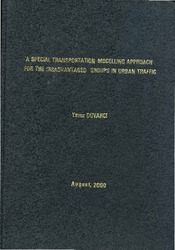Please use this identifier to cite or link to this item:
https://hdl.handle.net/11147/2990| Title: | A Specaial Transportation Modelling Approach for the Disadvantaged Groups in Urban Traffic | Authors: | Duvarcı, Yavuz | Advisors: | Süel, Akın | Publisher: | Izmir Institute of Technology | Abstract: | It has been known that conventional transportation models and studies have been inadequate to solve the acute transportation problems in the urban areas to date that overwhelmingly those disadvantaged groups face. The major reason is probably that the qualitative and social parameters that could be the real factors in the explanation of the "disadvantagedness" have not been efficiently considered in the modelling because of the uncertainty, and non-normative nature of the models.This thesis study as a normative one offers basically two methodological approach that can be integrated to the normal models: First, the clear-cut defInition of so-called disadvantaged by the cluster analysis method, and second, application of the modelling procedures both for normal case and for the disadvantaged simulatenously by which the determination of policy packages (policy capturing) is probable on the basis ofthe differences between the two models. The improvement of disadvantaged means getting closer to the normality in transportation conditions. With this, it is meant that policy-making to improve the disadvantaged can even start from the modelling stages.As an innovative approach, vanous correlated variables are grouped into "Major" variables in the form of function formulations, which are thought best represent the social/qualitative parameters.In the model runs, latest version of TRANUS (6.0) was used to speed up the modelling process (especially the Trip Assignments). With TRANUS., categorical handling is possible. It is found that there appears a remarkable discrepancy between the two models at the level of Trip Generations (productions), and some different variables could be used in the model for disadvantaged.Finally, in the Correspondence Module (or, category analysis), as of the adopted equity principles, the association of those disadvantaged categories (as transportation categories) with the "disadvantagedness" levels is maintained. This matching process also provided a gauge with which the policies could be produced for the matching transportation (disadvantaged) categories. To see the effectiveness of the method, three simulations are run based on the three policy scenarios where any move towards betterment in the condition of disadvantaged is welcome.As the result of this study, though less than expected, an improvement was observed in the travel conditions of the disadvantaged. It is observed not surprisingly that policy formulations playing around the income related and vehicle ownership variables can be more successful in obtaining better results. More frequent trials with better scenario formulations as well would have ended with better results.Key Words: Transportation Planning, Equity, Transportation Disadvantaged, Cluster Analysis, Category (Correspondence) Analysis, Transportation Ethics, Modelling-, Fuzzy Sets Analysis, Sensitivity Analysis, Simulation-, Gini Index. | Description: | Thesis (Doctoral)--Izmir Institute of Technology, City and Regional Planning, Izmir, 2000 Includes bibliographical references (leaves: 294-301) Text in English; Abstract: Turkish and English xx, 400 leaves |
URI: | http://hdl.handle.net/11147/2990 |
| Appears in Collections: | Phd Degree / Doktora |
Files in This Item:
| File | Description | Size | Format | |
|---|---|---|---|---|
| T000099.pdf | DoctoralThesis | 155.02 MB | Adobe PDF |  View/Open |
CORE Recommender
Page view(s)
322
checked on Jun 10, 2025
Download(s)
76
checked on Jun 10, 2025
Google ScholarTM
Check
Items in GCRIS Repository are protected by copyright, with all rights reserved, unless otherwise indicated.